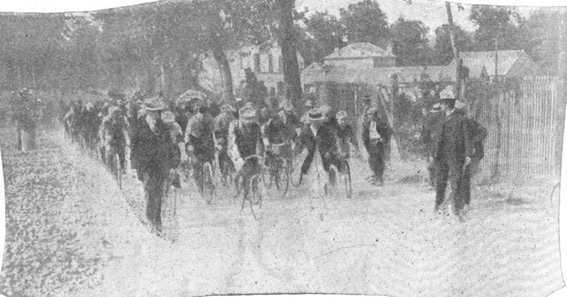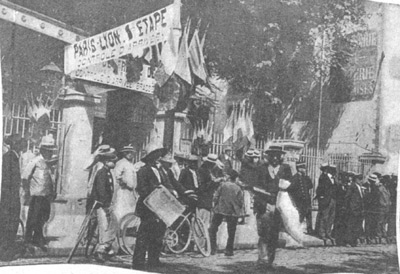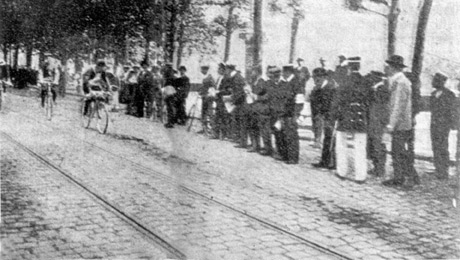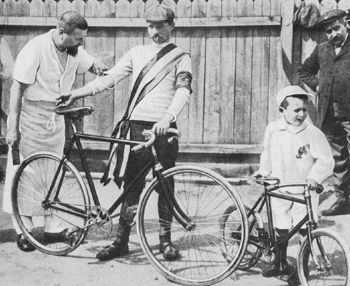
Distance: 2,428 km
Average speed: 25.68 km/hr
60 Riders
21 classified finishers
The Tour de France was suggested to Henri Desgrange, editor of L'Auto (ancestor to today's l'Equipe), as a sales promotion to win a circulation war with competing sports newspaper Le Vélo. It was to be a Six-Day race, only on the road, which would have to start in the dark and could take over 17 hours to complete. The race proved to be an instant hit, L'Auto's circulation soared and Desgrange went down in history as the father of the greatest sporting event in the world.
On Jan 19, 1903, L'Autoannounced the first Tour de France, "the greatest cycling trial in the entire world". The first schedule was for a 5-week race with the winner as the racer with the lowest elapsed time racing after all the stages. This total time is still called the "General Classification". A week before the start only 15 riders had signed up, so Desgrange shortened and re-scheduled the race, promised expense money of 5 francs a day to the first 50 racers who signed up and dangled a 20,000 franc purse of prize money.
At 3:16 PM, July 1, 1903, the first peloton of 60 riders departed from the now famous Cafe au Réveil-Matin in Montgeron on the southern outskirts of Paris, of these 21 were sponsored or professional racers. They were to ride 6 stages totaling a staggering 2,428 kilometers. Desgrange wanted his race to be a superhuman test of an individual's endurance and strength, so pacers were banned except for the final stage.
 | |||
The riders get ready to start.
| |||
 | |||
Desgrange's 60-man peloton riding together
| |||
Maurice Garin, nicknamed "the Chimney-Sweep", in the red, white and blue tricolor bike of his sponsor, La Française, won the first stage of the first Tour, beating Émile Pagie by 55 seconds and held the lead throughout the Tour. Only 37 riders were able to complete the day's racing. The last rider took more than 20 hours longer than Garin to get to Lyon.
 | |||
The first stage finish line in Lyon
| |||
 | |||
Leon Georget finishes third in the first stage, 34 min, 59 sec behind stage winner Garin. Georget would drop out of the Tour in stage 5.
| |||
 |  | |||||
Maurice Garin, in his trademark white coat and flat cap racing in the '03 Tour
| ||||||
Best action photo ever seen of Garin
| ||||||
On July 19, only 21 riders of the 60 finished the TDF. The 20,000 spectators at Paris' Parc de Princesvelodrome saw Maurice Garin win the final stage and win the Tour. The final finisher came in over two days later. While the famed "Yellow Jersey" worn by the man leading the Tour would not be adopted until 1919, Garin was given a green armband to signify his lead during the 1903 Tour, and the Lanterne Rouge or Red Lantern was used to designate the rider in last place. Arsène Millocheau has the dubious fame of being the first Lanterne Rouge by coming in at 64 hours, 57 minutes, 8 seconds behind Garin in total time.
 | |||||
Garin is greeted by enthusiastic fans.
| |||||
 | |||||
1903 Tour winner Maurice Garin having a smoke. Pictured with him are his son (on right with little bike) and his masseur.
| |||||
Garin pocketed 6,125 francs for his exploit, about $40,000 in U.S. dollars today. His winning margin of 2 hours and 49 minutes remains the largest in Tour history. The first Tour at 2,428 km remains the second shortest ever. The average speed for the first Tour was 25.679 km per hour. The 50th Anniversary Tour in 1953 averaged 34.593 km per hour and the speed of the Centennial 2003 Tour was 40.94 km per hour.
 | ||
Racers at the feed zone, 1903.
| ||
The Tour was a fantastic success. Circulation of L'Auto boomed. 130,000 copies were printed for the final stage (an increase of 100,000). Le Vélo went out of business and the Tour de France was born.
Final 1903 Tour de France General Classification:
- 1. Maurice Garin: 94 hours 33 minutes 14 seconds
- 2. Lucien Pothier @ 2 hours 59 minutes 2 seconds
- 3. Fernand Augereau @ 4 hours 29 minutes 24 seconds
- 4. Rodolphe Muller @ 4 hours 39 minutes 30 seconds
- 5. Jean Fischer @ 4 hours 58 minutes 44 seconds
 | ||
Leon Georget signs in under the watchful eye of an official. To minimize cheating riders signed in a stops along each stage.
(Excerpt is from "The Story of the Tour de France", Volume 1) |
Wonderful account of history. Thanks for sharing.
ReplyDeleteGaurav Bhatnagar, thanx a lot : )
Delete